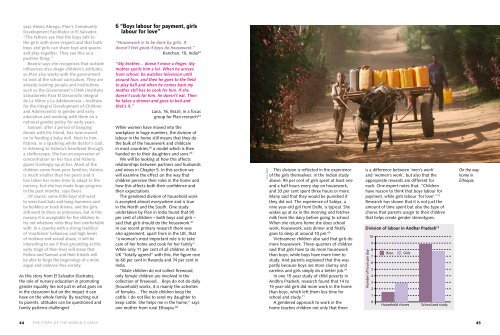Because I am a girl: The State of the World's ... - Plan Deutschland
Because I am a girl: The State of the World's ... - Plan Deutschland
Because I am a girl: The State of the World's ... - Plan Deutschland
You also want an ePaper? Increase the reach of your titles
YUMPU automatically turns print PDFs into web optimized ePapers that Google loves.
says Alexia Abrego, <strong>Plan</strong>’s Community<br />
Development Facilitator in El Salvador.<br />
“<strong>The</strong> fa<strong>the</strong>rs see that <strong>the</strong> boys talk to<br />
<strong>the</strong> <strong>girl</strong>s with more respect and that both<br />
boys and <strong>girl</strong>s can share toys and spaces<br />
and play toge<strong>the</strong>r. <strong>The</strong>y see this as a<br />
positive thing.”<br />
Beatriz says she recognises that outside<br />
influences also shape children’s attitudes,<br />
so <strong>Plan</strong> also works with <strong>the</strong> government<br />
to look at <strong>the</strong> school curriculum. <strong>The</strong>y are<br />
already training people and institutions<br />
such as <strong>the</strong> Government’s ISNA (Instituto<br />
Salvadoreño Para El Desarrollo Integral<br />
de La Niñez y La Adolescencia – Institute<br />
for <strong>the</strong> Integral Development <strong>of</strong> Children<br />
and Adolescents) in gender and early<br />
education and working with <strong>the</strong>m on a<br />
national gender policy for early years.<br />
S<strong>am</strong>uel, after a period <strong>of</strong> banging<br />
drums with his friend, has now moved<br />
on to feeding a baby doll. Next to him,<br />
Fatima, in a sparkling white doctor’s coat,<br />
is listening to Valeria’s heartbeat through<br />
a stethoscope. She has an expression <strong>of</strong><br />
concentration on her face and Valeria<br />
gazes trustingly up at her. Most <strong>of</strong> <strong>the</strong><br />
children come from poor f<strong>am</strong>ilies; Valeria<br />
is much smaller than her peers and it<br />
has taken her some time to adapt to <strong>the</strong><br />
nursery, but she has made huge progress<br />
in <strong>the</strong> past months, says Beeri.<br />
Of course, some little boys still want<br />
to wear hard hats and bang h<strong>am</strong>mers and<br />
be builders or truck drivers, and <strong>the</strong> <strong>girl</strong>s<br />
still want to dress as princesses, but in this<br />
nursery it is acceptable for <strong>the</strong> children to<br />
try out whatever roles <strong>the</strong>y feel comfortable<br />
with. In a country with a strong tradition<br />
<strong>of</strong> ‘machismo’ behaviour and high levels<br />
<strong>of</strong> violence and sexual abuse, it will be<br />
interesting to see if <strong>the</strong>ir grounding at this<br />
early stage <strong>of</strong> <strong>the</strong>ir lives will mean that<br />
Fatima and S<strong>am</strong>uel and <strong>the</strong>ir friends will<br />
be able to forge <strong>the</strong> beginnings <strong>of</strong> a more<br />
equal and violence-free society.<br />
As this story from El Salvador illustrates,<br />
<strong>the</strong> role <strong>of</strong> nursery education in promoting<br />
gender equality lies not just in what goes on<br />
in <strong>the</strong> classroom but on <strong>the</strong> impact it can<br />
have on <strong>the</strong> whole f<strong>am</strong>ily. By reaching out<br />
to parents, attitudes can be questioned and<br />
f<strong>am</strong>ily patterns challenged.<br />
6 “Boys labour for payment, <strong>girl</strong>s<br />
labour for love”<br />
“Housework is to be done by <strong>girl</strong>s. It<br />
doesn’t feel good if boys do housework.”<br />
Kanchan, 10, India 63<br />
“My bro<strong>the</strong>r… doesn’t move a finger. My<br />
mo<strong>the</strong>r spoils him a lot. When he arrives<br />
from school, he watches television until<br />
around four, and <strong>the</strong>n he goes to <strong>the</strong> field<br />
to play ball and when he comes back my<br />
mo<strong>the</strong>r still has to cook for him. If she<br />
doesn’t cook for him, he doesn’t eat. <strong>The</strong>n<br />
he takes a shower and goes to bed and<br />
that’s it.”<br />
Lana, 16, Brazil, in a focus<br />
group for <strong>Plan</strong> research 64<br />
While women have moved into <strong>the</strong><br />
workplace in huge numbers, <strong>the</strong> division <strong>of</strong><br />
labour in <strong>the</strong> home still means that <strong>the</strong>y do<br />
<strong>the</strong> bulk <strong>of</strong> <strong>the</strong> housework and childcare<br />
in most countries, 65 a model which is <strong>the</strong>n<br />
handed on to <strong>the</strong>ir daughters and sons. 66<br />
We will be looking at how this affects<br />
relationships between partners and husbands<br />
and wives in Chapter 5. In this section we<br />
will ex<strong>am</strong>ine <strong>the</strong> effect on <strong>the</strong> way that<br />
children perceive <strong>the</strong>ir roles in <strong>the</strong> home and<br />
how this affects both <strong>the</strong>ir confidence and<br />
<strong>the</strong>ir expectations.<br />
<strong>The</strong> gendered division <strong>of</strong> household work<br />
is accepted almost everywhere and is true<br />
in <strong>the</strong> North and <strong>the</strong> South. One study<br />
undertaken by <strong>Plan</strong> in India found that 95<br />
per cent <strong>of</strong> children – both boys and <strong>girl</strong>s –<br />
said that <strong>girl</strong>s should do <strong>the</strong> housework. 67<br />
In our recent primary research <strong>the</strong>re was<br />
also agreement, apart from in <strong>the</strong> UK, that<br />
“a woman’s most important role is to take<br />
care <strong>of</strong> her home and cook for her f<strong>am</strong>ily”.<br />
While only 11 per cent <strong>of</strong> all children in <strong>the</strong><br />
UK “totally agreed” with this, <strong>the</strong> figure rose<br />
to 66 per cent in Rwanda and 74 per cent in<br />
India.<br />
“Male children do not collect firewood,<br />
only female children are involved in <strong>the</strong><br />
collection <strong>of</strong> firewood… Boys do not do daily<br />
[household] works, it is mainly <strong>the</strong> activities<br />
<strong>of</strong> females… <strong>The</strong> male children keep <strong>the</strong><br />
cattle. I do not like to send my daughter to<br />
keep cattle. She helps me in <strong>the</strong> home,” says<br />
one mo<strong>the</strong>r from rural Ethiopia. 68 This division is reflected in <strong>the</strong> experience<br />
<strong>of</strong> <strong>the</strong> <strong>girl</strong>s <strong>the</strong>mselves: in <strong>the</strong> Indian study<br />
above, 95 per cent <strong>of</strong> <strong>girl</strong>s spent at least one<br />
and a half hours every day on housework,<br />
and 33 per cent spent three hours or more.<br />
Many said that <strong>the</strong>y would be punished if<br />
<strong>the</strong>y did not. <strong>The</strong> experience <strong>of</strong> Sabiya, a<br />
nine year-old <strong>girl</strong> from Delhi, is typical. She<br />
wakes up at six in <strong>the</strong> morning and fetches<br />
milk from <strong>the</strong> dairy before going to school.<br />
When she returns home she does school<br />
work, housework, eats dinner and finally<br />
goes to sleep at around 10 pm. 69<br />
Vietn<strong>am</strong>ese children also said that <strong>girl</strong>s do<br />
more housework. Three-quarters <strong>of</strong> children<br />
said that <strong>girl</strong>s have to do more housework<br />
than boys, while boys have more time to<br />
study. And parents explained that this was<br />
partly because boys are more clumsy and<br />
careless and <strong>girl</strong>s simply do a better job. 70<br />
In one 15-year study <strong>of</strong> child poverty in<br />
Andhra Pradesh, research found that 14 to<br />
15 year-old <strong>girl</strong>s did more work in <strong>the</strong> home<br />
than boys, which left <strong>the</strong>m less time for<br />
school and study. 71<br />
A gendered approach to work in <strong>the</strong><br />
home teaches children not only that <strong>the</strong>re<br />
10<br />
9<br />
8<br />
7<br />
6<br />
5<br />
4<br />
3<br />
2<br />
1<br />
0<br />
A l f B e r g<br />
is a difference between ‘men’s work’<br />
and ‘women’s work’, but also that <strong>the</strong><br />
appropriate rewards are different for<br />
each. One expert notes that: “Children<br />
have reason to think that boys labour for<br />
payment, while <strong>girl</strong>s labour ‘for love’.” 72<br />
Research has shown that it is not just <strong>the</strong><br />
<strong>am</strong>ount <strong>of</strong> time spent but also <strong>the</strong> type <strong>of</strong><br />
chores that parents assign to <strong>the</strong>ir children<br />
that helps create gender stereotypes.<br />
Division <strong>of</strong> labour in Andhar Pradesh 73<br />
Number <strong>of</strong> hours per day<br />
Boys<br />
Girls<br />
Household chores<br />
School and study<br />
On <strong>the</strong> way<br />
home in<br />
Ethiopia.<br />
44 <strong>the</strong> s tate <strong>of</strong> <strong>the</strong> world’s <strong>girl</strong>s 45



